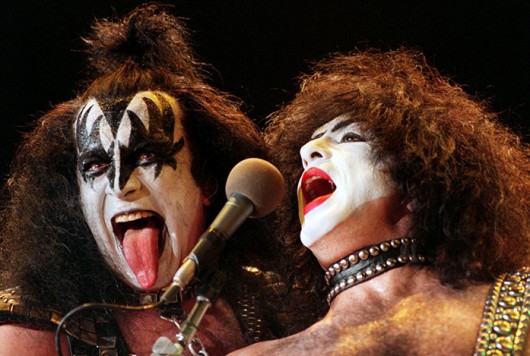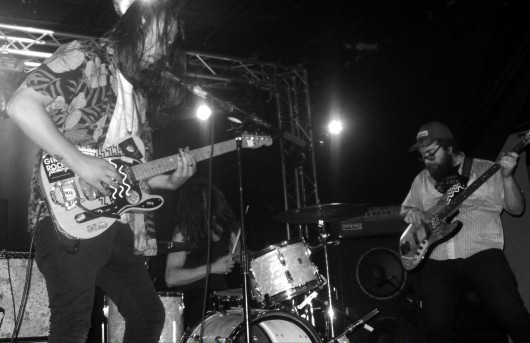
Gene Simmons (left) and Paul Stanley of rock band KISS perform at the Thunderdome in St. Petersburg, Fla., in 1996.
Credit: Courtesy of MCT
Gene Simmons has finally come to save me from a decade of complete waste — perhaps he’s even come to rescue you.
In a Sept. 4 Esquire interview administered by his own son, Nick Simmons, Gene officially confirms that “Rock is finally dead.”
As if being tucked into bed and preparing for sweet dreams, young Nick can’t seem to fall asleep without a cute little story from Daddy. Therein, our bored, relevance-craving hero Papa Gene spews his confused s— off of the tip of his wild tongue and deep into the fragile, wondrous mind of his baby boy.
Gene’s introduction to the tale — “Don’t quit your day job” — couldn’t be more ridiculous coming from the KISS frontman with all his lazy, arena-style song-writing, gimmicky image and worldwide merchandising. Must have been rough sitting still during makeup before all those giant shows.
Gene said record companies — before the Internet and file-sharing — were the reason why great artists such as The Beatles, The Rolling Stones, Prince and Jimi Hendrix, were able to tour and be heard. This is, of course, because people would have never otherwise listened to them, seeing as none of these musicians were very groundbreaking.
Gee — it was the record companies the whole time!
That’s a whole different conversation, seeing as a plethora of musicians — past and present — have opened up about record labels and companies one way or another. From Tom Petty’s 1979 bankruptcy filing and refusal to sell any more records under MCA to the music blog articles and musician accounts of barely breaking even after years of big label contract “service,” no one should fully trust a “suit.”
Regardless, it’s not that the industry is dead, Gene, baby. You’re just past your prime in a time that is changing, and all of those kids wasting time writing songs and playing guitars now rely on themselves to enjoy, perform and sell their brand — I mean music, not lunchboxes and bobbleheads.
But wait — “Rock did not die of old age,” Gene tells his son, “It was murdered.” He goes on with a metaphor about a “15-year-old next-door neighbor” who killed the great artists of our future, all by himself. Easy, bud. Gene only feeds into the repeating pattern of old retired rock stars pissing the bed over file-sharing and music piracy.
As someone in the generation of freshly-murdered music potential, not once have I seen a current artist get on stage and whine about how screwed up music acquisition has become. Nobody can give a s— about it because nearly everyone is participating, and it’s a practically unstoppable act. The whole affair happens with such volume, the countless subgenres of rock ‘n’ roll literally can’t be anything less than thriving.

Assistant photo editor Jon McAllister (left) performs with his band, SHVS.
Credit: Courtesy of Jon McAllister
Everything is so accessible and readily available (for free) that album leaks are a common process. Same with streaming: Current artists are adapting to the game in intelligent, prosperous ways. The age of album sales was replaced by individualized possession of what is basically an infinite iTunes library, which means people don’t have to ever stop discovering new music, possibilities or sources of inspiration.
The point is, most of us in the “murdered” generation look at rock — or music altogether — and think “killer artist!” or “incredible album!” or “gorgeous melody!” Across the table, Gene Simmons is that rude relative at the family gathering, persistently asking about your annual income.
See, I’ve been in bands, living the dream in this foolish, no-hope musician “phase” for more than a decade now — I’m sure to be deaf someday, broke from all the traveling and equipment purchases, two full-length albums deep — but I now realize where I went wrong: Nobody wanted to sell a pinball machine with my face on it.
Sure, KISS was wildly successful, but if there’s anyone in a position to offer advice like, “you’re better off not even learning how to play guitar or write songs,” as Gene Simmons tells his son, it sure as hell isn’t Gene Simmons. But what’s the point in making music when, as Gene sees it, “nobody will pay you for the 10,000 hours you put in to create what you created”?
10,000 hours, though!
Let’s figure this out together: If KISS’s several dozen singles took most of the band’s time to perfect, the creative process of “Rock and Roll All Nite” probably took a ballpark estimate of over 150 hours. “Gene-ius” Simmons must have felt the same way in 1975, seeing as there’s no way he took any time learning guitar or writing decent lyrics.
In reality, KISS’s “Rock and Roll All Nite” isn’t that far off from a song like DJ Snake & Lil Jon’s collaborative “Turn Down for What” when it comes to concepts and style.
However, the true punch line of Gene’s awful concession suggestion might be within the array of rhetorical questions to his son, including hits such as, “Where’s the next Bob Dylan? Where’s the next Beatles? Where are the songwriters? Where are the creators?” — all the way to the age-old, mind-altered collegiate freshman concern, “What is the next ‘Dark Side of the Moon?’” Seriously, maaaan.
C’mon, Gene. You’re going to have to allow 15-year-olds to have dreams of KISS-caliber grandeur. Besides, there is no “next Beatles,” dummy. But there’s a possibility that some developing minds in the world might just usher in the “next” thing as long as they avoid stupid conversations with has-been morons like Gene Simmons. What kind of musician tells people to give up on learning music?
There is but one constant: Old s— has happened, and new s— is happening. So leave us out of your music murderer accusations before you accidentally bite your tongue.


